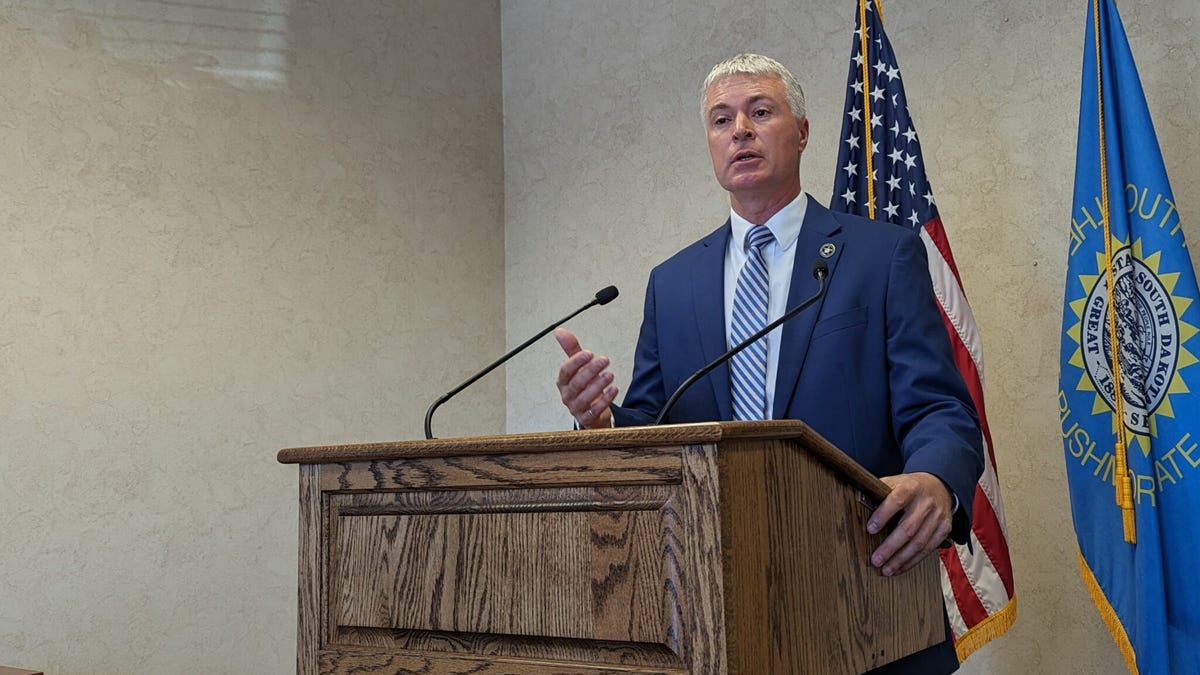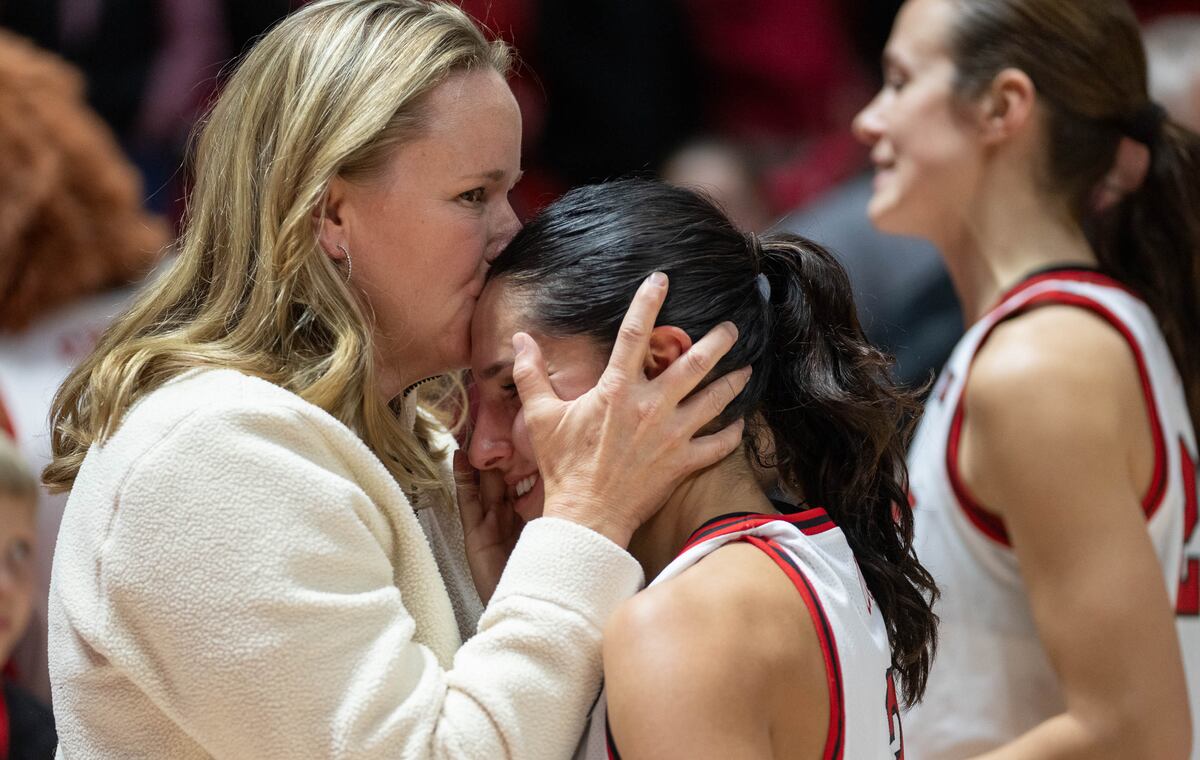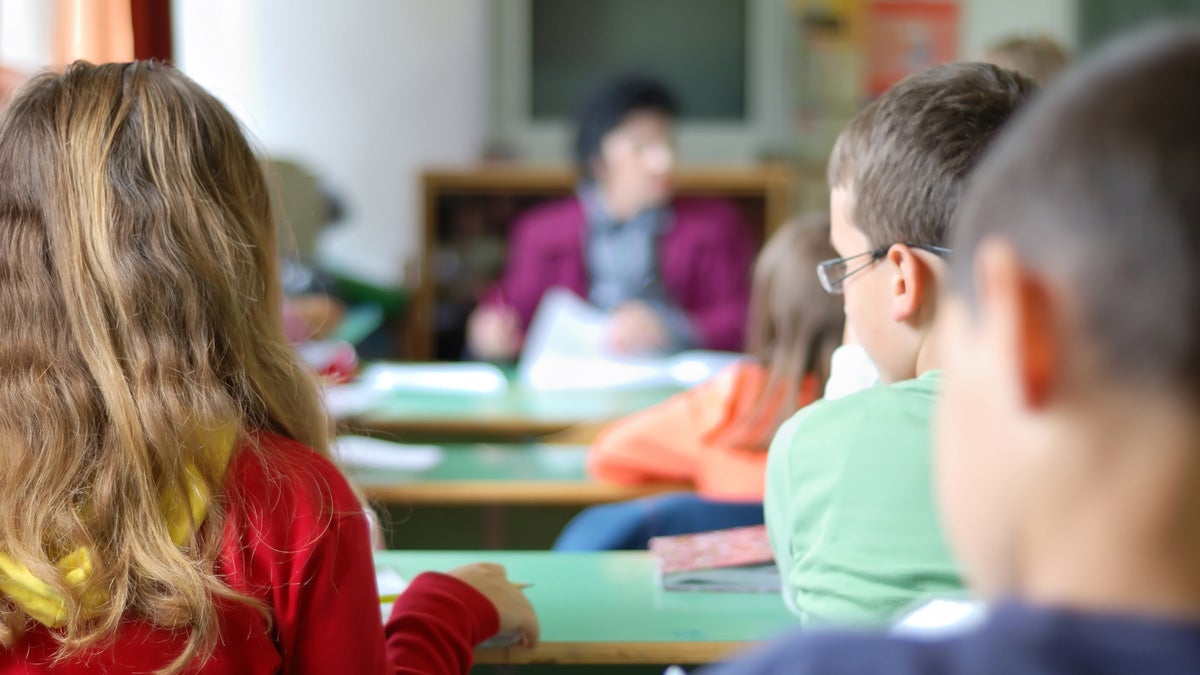As Lynne Roberts walked through the entrance of the Huntsman Center on Wednesday night, she caught a glimpse of a feature she’d never seen before.
“So that’s where the ticket office is,” she thought to herself.
For so long, the former Utah women’s basketball head coach has made her usual entrance through the tunnel and onto the shiny hardwood of the 50-year-old arena. But, on this night, she was a spectator for the first time in the building, no longer the leader of the program she’d built over the last decade.
And even if her former team, No. 22 Utah, was defeated by No. 12 Kansas State 71-47, Roberts couldn’t help but deliver some emotional coaching points and, most of all, embrace the members of the team she relentlessly coached the last few seasons.
“It’s interesting to be on this side of the court,” Roberts told The Salt Lake Tribune after the game. “I don’t care that they had a bad game. I just want to give them hugs and tell them to focus on the next game. This game was not who they are.”
In moments, Roberts clapped along like a typical fan.
Other times, she embraced her former players and waved to the fans inside the arena that had been a second home for 10 years of her coaching career.
“That’s why you coach for the relationships this group has. At Utah, we have unbelievable character with our players, and I’m proud of that. So it makes it even more rewarding to give them a hug,” Roberts said.
In November, she received a call from Raegan Pebley, the general manager of the WNBA’s Los Angeles Sparks, to become the next head coach of the franchise in her home state.
She pondered on the decision for days.
She had signed a contract extension the summer before. How could she leave her program at the beginning of the season? What would coaching in the professional ranks be like?
Roberts said, ultimately, the decision came down to wanting to take the next step in her career.
“This was where I wanted to be, and I believed in what we were building, and so I never had my eyes up looking at other options,” Roberts said of her time in Salt Lake City. “But once the Sparks reached out … it just kind of kept feeling more and more right. But the thing in the back of my head was the thought of leaving this group of players, it’s just hard.
“The timing is right with the WNBA where it’s at right now, the franchise is right for me, not just being in California, but the Sparks are investing in the team in a different way, and they want to win championships. It felt right to have a chance to roll the dice. You know, I’m not young, but I don’t feel old. So I thought this is the time to professionally, be like, let’s go, let’s, let’s see if I can do it.”
(Francisco Kjolseth | The Salt Lake Tribune) Utah Utes guard Gianna Kneepkens (5) is consoled by former Utah women’s coach Lynne Roberts following a 47-71 loss to Kansas State in NCAA basketball in Salt Lake City on Wednesday, Jan. 8, 2025.
Before she announced her decision to leave for the WNBA, Roberts hosted a team meeting to inform the players and the coaching staff about her next steps.
Tears were shed.
Associate head coach Gavin Petersen was elevated to the lead job.
Then both sides moved onto their new beginnings.
It’s always nice to revisit the past, though, and Wednesday night provided Roberts a chance to reflect on her time in Salt Lake City.
“It felt good to be back there, and it wasn’t weird,” Roberts said. “I love these players and coaches. These are my people. So it felt really good to be back, and tonight was not their best game, but it’s not who they are. They’ll be fine.”
Obviously, it wasn’t the Utes’ best night. Roberts coached a few of those games during her time at Utah. She also won 165 games and made it to the NCAA Tournament six times.
Roberts said she has watched every Utah game since departing from the program. During the game, Roberts caught herself muttering her usual coaching points under her breath while sitting in her courtside seat.
(Francisco Kjolseth | The Salt Lake Tribune) Former Utah women’s coach Lynne Roberts watches her former players take on Kansas State in NCAA basketball in Salt Lake City on Wednesday, Jan. 8, 2025.
After the contest, once she was done signing autographs for Utah fans and embracing her former players, she shared a few lessons with junior guard Matyson Wilke.
Wilke nodded her head as Roberts pointed to the baseline and shared her wisdom.
Clearly, some things never change.
“I just wanted to encourage her,” Roberts said. “Players want to win as badly as coaches do. Right? It’s hard, and you lose and you don’t play well, and you kind of get humbled on your court, so I was just giving her some love.
“I know what they’re running and what they’re trying to run. So there were some things I was saying under my breath (during the game), but nothing that I would have done differently.”
But that doesn’t mean Roberts wasn’t doing her own due diligence for the Sparks.
She chose the Kansas State matchup for a specific reason.
The 2025 WNBA Draft is in April, and Los Angeles is in the midst of a rebuild, which means it was the perfect time for some college scouting.
“Obviously, I wanted to give Gavin his space because it’s his program,” Roberts said of her choice to attend the Kansas State matchup. “The last thing I want to be is a distraction. …I knew after Christmas probably would be a good time, and then Kansas State was good, and I wanted to watch them. They’ve got Serena Sundell, who’s a potential WNBA player.”
As both Roberts and the Utes look toward the future, Wednesday night was a moment of reconnection for both parties. Roberts helped the Utes become a nationally relevant program during her tenure, which is what she set out to do when she was hired from the University of Pacific in 2015.
She was recognized for her tenure with a shout-out from Utah’s public address announcer and a standing ovation from the crowd at the arena.
But, for Ronberts, seeing her former players was even more special.
The former Utah coach was seen kissing 5-foot-6 dynamo guard Inês Vieira on the forehead as if she was one of her children. She embraced Gianna Kneepkens with a bear hug.
Winning will always be a part of Roberts’ legacy in Salt Lake City. But she’s also glad to have developed her players into better humans.
“My hope is that I helped make women’s basketball relevant in Salt Lake City,” Roberts said. When I got here, I said that was the goal … and people kind of said, ‘Oh, that’s cute, that you think you can do that.’ So, I take pride in that. But we also have quality players here that are quality humans. I’m incredibly proud of that.”
And it’s that portion of her legacy with the Utes that she hopes to carry with her into the WNBA and beyond.
“I go into this with a humble confidence,” Roberts said, as she looked around the Huntsman Center with admiration. “I’m confident in my ability, and I’m confident in my experience, but I’m also humbled to know that I’ve got a lot to learn and a lot to experience.
“I’m just going to take it one year at a time. Luckily, I have a few years. I just want to win. So what impact can I make in LA? I want to win.”
Note to readers • This story is available to Salt Lake Tribune subscribers only. Thank you for supporting local journalism.






























/cdn.vox-cdn.com/uploads/chorus_asset/file/25822586/STK169_ZUCKERBERG_MAGA_STKS491_CVIRGINIA_A.jpg)
